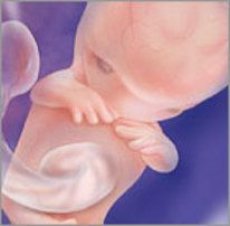Medical expert of the article
New publications
Pregnancy: 10 weeks
Last reviewed: 04.07.2025

All iLive content is medically reviewed or fact checked to ensure as much factual accuracy as possible.
We have strict sourcing guidelines and only link to reputable media sites, academic research institutions and, whenever possible, medically peer reviewed studies. Note that the numbers in parentheses ([1], [2], etc.) are clickable links to these studies.
If you feel that any of our content is inaccurate, out-of-date, or otherwise questionable, please select it and press Ctrl + Enter.

How the child grows:
Despite being only 2.5 centimeters long and weighing 7 grams, your baby has already passed the most critical part of its development. This is the beginning of what is called the embryonic period, a time when the tissues and organs in its body are rapidly growing and developing.
Its vital organs — including kidneys, intestines, brain, and liver (now producing red blood cells instead of a yolk sac) — are beginning to function, though they will continue to develop for the rest of the pregnancy. If you could look inside your uterus, you would see tiny nails forming on your fingers and toes, as well as the fine down on your baby's skin.
The baby's limbs can now bend, the spinal column is clearly visible through the translucent skin, the spinal nerves are beginning to develop, and the baby's forehead is temporarily protruding. In the coming weeks, the baby will again double in size.
Important: Each baby's development is unique. Our information is designed to give you a general idea of fetal development.
Changes in the expectant mother
At your next prenatal appointment, you should be able to hear your baby’s heartbeat. Before pregnancy, your uterus was the size of a small pear; this week, it’s the size of a grapefruit. Your regular clothes are tight and your bra is small. You’ll need to review your wardrobe and find comfortable clothes. Depending on your exercise level, you might choose swimming or walking to stay active throughout the nine months. Exercise helps maintain muscle tone and endurance—qualities that will help you during pregnancy, in preparation for labor, and in getting back into shape more quickly after your baby is born. (Unfortunately, there’s no evidence that regular exercise speeds up labor.)
Lunchtime Sickness "My own version of morning sickness, developed every day at lunchtime. I couldn't eat anything. But I found a way out: I moved my biggest meal to the morning, and at lunchtime I mostly ate snacks." - Susan.
3 Questions About Infections During Pregnancy
- What you need to know about urinary tract infections during pregnancy?
Urinary tract infections are the most common bacterial infections during pregnancy. High progesterone levels are partly to blame. The hormone relaxes the urinary tract, which can slow the flow of urine, giving bacteria more time to grow.
An infection can also develop when bacteria from the rectum enter the urethra and urinary tract, where they continue to multiply. Sometimes they cause a bladder infection called cystitis. Symptoms of cystitis include pain, discomfort, burning when urinating, frequent urination, and abdominal pain. The urine may be cloudy and have an unpleasant odor.
It is important to see a doctor if you suspect you have a bladder infection. Untreated cystitis can lead to a kidney infection, which can increase the risk of premature birth. For cystitis, your doctor will prescribe safe antibiotics that will reduce symptoms within a few days. Follow your doctor's instructions when taking medications.
Bacteria can also multiply in the urinary tract without causing symptoms, so-called asymptomatic bacteriuria. This can be detected by a urine test taken at the first consultation.
- What You Need to Know About Bacterial Vaginosis During Pregnancy
Bacterial vaginosis is a reproductive tract infection caused by an overgrowth of bacteria that are normally found in small numbers in the vagina. Symptoms of bacterial vaginosis include a foul-smelling white or grayish discharge, irritation, and itching, although most cases of bacterial vaginosis cause no symptoms. Bacterial vaginosis is associated with an increased risk of preterm labor and premature rupture of the membranes.
- What do I need to know about thrush during pregnancy?
Yeast infections are a common vaginal infection, especially during pregnancy. They are caused by microscopic fungi that are present in the vagina of almost one in three women and become a problem when their proliferation accelerates. Increased estrogen levels during pregnancy promote the production of glycogen, which is an excellent environment for the fungi to grow.
Thrush will not harm the baby, but if the infection develops during labor, there is some risk that the newborn will come into contact with the fungus as it passes through the birth canal. As a result, the baby may develop thrush. This condition is not dangerous and is easily treated in healthy babies.
This week's activity: Buy new lingerie. Special bras for pregnant women will provide additional support and comfort for the expectant mother.


 [
[